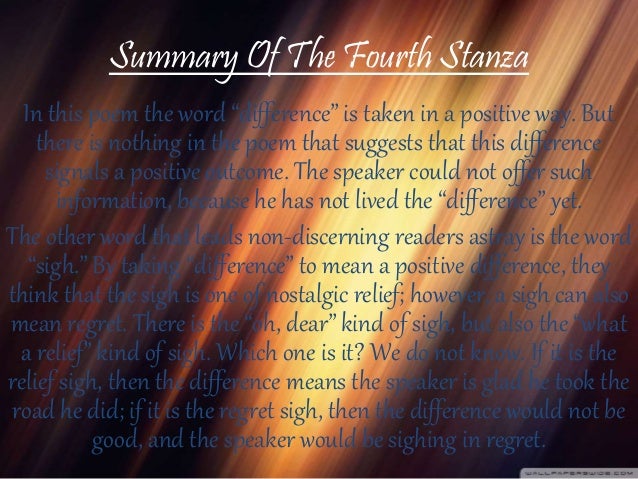

He learns painfully that Man cannot have things all his own way he is not only bound to make a choice but also that the choice he makes is irrevocable. We notice that when the road forks, the narrator regrets that he possibly cannot travel both roads because he is ‘one traveller’. He has not yet come to terms with the fact that Man must learn to accept and live with his limitations. When he has made his choice he wistfully yearns for the alternative which he has been forced to reject. But unlike Hamlet, he regrets the choices he makes. Very unselfconsciously he reveals himself to us as one who is Hamlet like, who is too intelligent and conscious to do anything without pondering (a bit too much) on the pros and cons of it. Ironically, it is the first person speaker himself who candidly presents himself to us, with all his faults and foibles. The Road not Taken shows Frost’s art and versatility marching ahead on the road of progress.

He speaks on the reader, the burden of critical intelligence, which, properly speaking, should be borne by the poet. We also feel at though the poem is quite good, Frost is shirking responsibility. We ourselves, as readers feel that though the decision of the poet is incomprehensible, his predicament is totally familiar to us. Speaking about the stanza form in this and some other poems, Thompson says that “an entirely different modification occurs when the four-stress lines are used in certain forms which are related to the ballad the five lines-stanzas, the six lines-stanzas, or the combined five and three stress-lines.” the pauses and exclamations that are found in the dramatic lyrics. It is a personal lyric and is devoid of the parentheses, the dashes. Each line has eight syllables with slight variations here and there to impart informality and casualness of tone. Simplicity, clarity, epigrammatic force and terseness are the hallmarks of the stanzas, each consisting of five lines. Winters also argues that in The Road not Taken Frost is mistaking whimsical impulse for moral choice, and this blunder obscures his understanding and we get a feeling that his mood regarding the value of the entire business is very uncertain. Winters feels: “All have a single theme: the, whimsical accidental and incomprehensible nature of the formative decision and I should like to point out that if one takes this view of the formative decision one has cut oneself off from understanding most of human experience, for in these terms there is nothing to be understood”. He has shown the wrath and ire of his angry mind through his devastating pen in his well-known essay, “ Robert Frost or the Spiritual Drifter as Poet”, in one clean sweep. Yvor Winters has spared no pains to speak in strong, derogatory terms about this poem. But perhaps it was not without an intuitive impulse that it was motivated. Hence, we find that the poet’s choice was logically incomprehensible and appears wholly arbitrary, whimsical and undetermined. In interviews, conversation and lectures, Frost always stresses that though the road he had taken had: There are no residues of self-respect, moral obligation, not even curiosity in Frost’s preference of the road he finally did take. There are no obvious reasons for Frost preferring one road to the other. In The Road not Taken, the problem of choice is very elementary. From birth till death, he has to make choices at every step-he chooses, deliberately-and in the best of men, it (this act of making a choice) is often coupled with a thorough knowledge of the consequences implied in making the choice. Perhaps, if asked, Frost would define man as a choice-making animal.


This inevitability, which apparently has an element of choice is brought in this oft-quoted and oft-misunderstood poem, The Road not Taken. He was inevitably guided towards his destination by some spirit, some unseen forces that keep working on man. Relating the poem to the reality of Frost’s experience, Untermeyer says that Frost has gone his own way. Nitchie points out this poem has for its theme, one of the major themes in Frost’s poetry- the problem of having to make a choice. Here the poet takes his chance and comments on the difficulty and importance of having to make a choice. The poet’s creative faculty gets enlivened when he faces the problem of having to choose one of the two roads at a bifurcation. In the poem, we find a rare blend of ‘inner lyric vision and the outer contemplative narration’. It has been acknowledged as one of the finest and most popular poems of the volume. The Road not taken was first published in 1916, in the volume of poems entitled Mountain Interval.


 0 kommentar(er)
0 kommentar(er)
